The best electric scooters 2024: top picks for every need
The best electric scooters money can buy
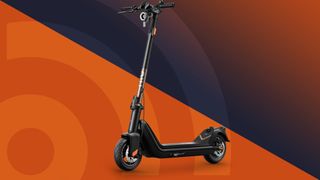
Buying one of the best electric scooters can help save you a ton of time and money when it comes to commuting and your daily travel.
Smaller and easier to use than a bike, they can cut out the daily cost of riding the subway or the bus and reduce your carbon footprint in the process.
We've tested many of the best electric scooters on the market, including premium and budget models, as well as options for commuting, off-road, and more.
Generally, the best electric scooters aren't the most powerful options with the highest top speeds. Instead, we've put together a guide that balances several key factors including power, build and design, portability and folding, and crucially price.
That's why the NIU KQi3 Pro is our top pick for 2024. There's always the TurboAnt M10 if you want a great value pick or you're on a budget. We also have top picks for commuters and students, too.
So scroll on for the best electric scooters on the market right now.
Best electric scooter overall
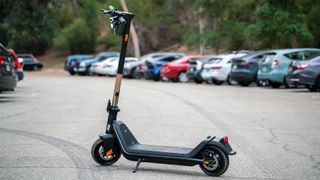
Specifications
Reasons to buy
Reasons to avoid
The NIU KQi3 Pro may not have that sleek and lightweight design that seems to have been the very first marker of an excellent electric scooter. But, these days, having a svelte e-scooter is no longer the priority. Besides, what this impressive model does offer is much more important: comfort.
Its brilliant fat tires, it turns out, are the ticket to a smooth ride. Each tire on this is 2.5 inches thick, allowing the scooter to have amazing shock absorption – not to mention, incredible traction. I took it out on this pothole-ridden road near my house and didn't find it necessary to weave through it just to avoid the small potholes and big cracks.
But, it takes more than that to convince folks, which is why NIU also slapped on amazing features like regenerative brakes, the always-on Halo headlight and rear light, zero starting (which activates as soon as you hit 200 riding meters for safety), and anti-theft.
The anti-theft feature is uncommon among e-scooters within this price range and is therefore a nice treat. Once it’s activated, an alarm will go off if someone tries to wheel the scooter away, ride it, or turn it on. So while it doesn't actually prevent someone from loading it on the back of their truck, you can count on it to make a huge fuss, which will hopefully deter petty thieves.
The best part is that for all of that and more, the NIU KQi3 Pro is surprisingly, amazingly affordable – more affordable than other premium e-scooters with less features. Is this the best electric scooter overall? A thousand times yes.
Read our full NIU KQi3 Pro review
Best value electric scooter
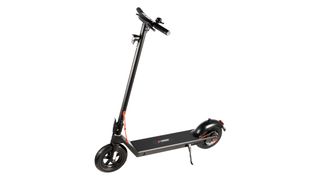
2. TurboAnt M10
Specifications
Reasons to buy
Reasons to avoid
You'll be surprised at how solid and well-made the TurboAnt M10 considering its price. It's our best value pick not just because of its affordable price tag, but because we found it to be very robust, it's built better than any of its rivals in this price range. There's also its incredibly lightweight design, which typically adds a premium.
To knock a couple of hundred bucks off its tag, TurboAnt has stripped it of extra frills, like security features and a more spacious deck. I found that it really isn't great for uphills either. However, I didn't mind the minimal features since that didn't really affect its overall performance and usability. I would just recommend that you invest in a good U-lock to secure it, which is something I use anyway even if an electric scooter I'm using does have an anti-theft system.
I've spent considerable time with this e-scooter and found it to be much more capable than it looks. It's got great shock absorption, thanks in large part to its 10-inch tires, which means you'll ride smoothly even on a road full of potholes. It's not as amazing as my top choice when it comes to shock absorption, but it's still better than most other models I've tested.
Plus, its brakes are extremely responsive, which is a nice touch as many e-scooters in this price range have subpar brake systems. For regular city commutes for less, this is the best electric scooter.
Best electric scooter for commuters
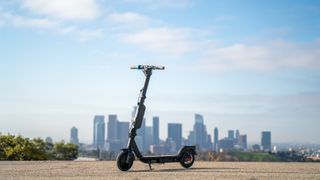
Specifications
Reasons to buy
Reasons to avoid
While most electric scooters keep the folding to a minimum – just enough to cut their size down to about half – Riley Scooters' RS3 has taken its folding skills to a whole new level. It's got the ability to essentially collapse to less than half its original size, making it easier to stow, store, and strut around with.
The folding mechanisms – I say mechanisms because there are five on it – are a tad clunky, and one of them can sometimes feel like a two-person job in my experience. But, get that process down to a science, and you'll start appreciating the convenience this scooter offers commuters. Aside from being compact and easy to store, it's also so much easier to carry.
The RS3 doesn't hold back on performance either. Despite having smaller tires with not much traction, it's incredibly smooth and snappy to ride, thanks in large part to its premium build. I found it to deliver great shock absorption as well, about on par with the TurboAnt M10, which by the way has bigger tires.
Those brakes are a revelation as well. Going downhill on my neighborhood's 20-degree slope on a new e-scooter has always been a scary thing as a lot of them have average brakes. With the RS3, however, I felt incredibly safe and secure doing so, which makes me want to recommend it to both experienced riders and newbies who haven't quite mastered the art of braking.
Read our full Riley Scooters RS3 review
Best luxury electric scooter
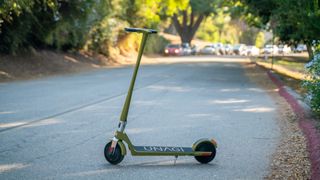
Specifications
Reasons to buy
Reasons to avoid
The Unagi Model One E500 might be the sleekest and most futuristic-looking e-scooter out there. More importantly, it's incredibly lightweight and easy to carry - perhaps the most lightweight one I've ever tested. And, its massive bright LCD panel looks just as elegant, which just elevates rides.
It isn't a slouch in performance either. A solid ride touting a 1000W motor, it definitely has a lot of power for more than just urban commutes. That motor allows it to haul its rider up a hill faster than other e-scooters. One thoughtful addition I love is the dedicated driving mode button that makes changing modes during rides a less stressful affair, I found, since my thumb need not move too far away from the throttle.
It comes with solid tires, instead of the more superior pneumatic tires, which offer better stability, suspension, climbing, and traction. Solid tires do have the advantage of needing less maintenance and not being prone to flats and punctures. However, they're not great at absorbing shocks. Unagi splits the difference by adding air pockets spread throughout the circumference of the wheel to help with shock absorption and stability.
Sadly, I found that those air pockets are no match for rougher roads with cracks and potholes, which means that the Model One E500 isn't the most comfortable ride on beaten roads. However, it rides beautifully on smoother streets so if you live in a city with newer roads, it's a commuter's dream.
Read our full Unagi Model One E500 review
Best electric scooter for performance
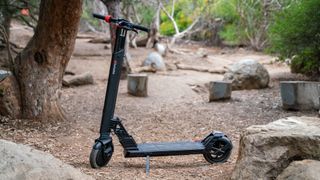
Specifications
Reasons to buy
Reasons to avoid
I never thought I'd love riding a big and heavy electric scooter like the TurboAnt V8 Dual-Battery around in urban spaces. After all, urban e-scooters are ideally lightweight and portable, and this one's the opposite of that. But, this one makes a compelling argument.
Don't read too much into its specs, though. The V8 may only have a 450W motor – which to be fair is already powerful in its own right – but the fact that it's a front hub motor means that it's got the ability to “peel out” by distributing the weight forward. Therefore, it's able to deliver a snappier start, allowing riders the ability to reach high speeds quicker. It's one of the very few commuter e-scooters I've tested that handled a 20-hill-grade slope decently.
Of course, the fact that it's got two batteries means it's got an impressively long range – 50 miles to be exact – that TurboAnt pairs with its fast-charging capabilities. You're also getting an extra charger so you can pop out the removable battery and charge both simultaneously, saving you time. I found this thoughtful extra to be incredibly useful, as it saves me a lot of time.
If you're looking for a much more powerful electric scooter, this is the best e-scooter for you. It may not be as sleek and lightweight as the other offerings on this list, but it gives them a run for their money on other things.
Read our TurboAnt V8 Dual-Battery review
Best electric scooter for students
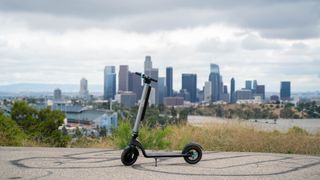
Specifications
Reasons to buy
Reasons to avoid
The Levy Plus is a brilliant all-round electric scooter that won't break the bank. It's got city commuter chops and tires that can handle rough roads. Coupled with its reasonable price tag, we recommend it as the best for students who want a fast way to get around campus or a sharp dash to work.
Its motor isn't the most powerful, however, it has formidable brakes and big fat tires that make it durable and rugged, perfect for any terrain.
Value-wise it's perfectly mid-range, but still offers both portability and performance. Crucially it folds so won't take up too much room in a college dorm, and it scored very highly for ease of assembly.
You won't find much better for much less when it comes to electric scooters, and while it's not the cheapest option on the market, you get an awful lot for your money.
Read our Levy Plus review
| Row 0 - Cell 0 | NIU KQi3 Pro | TurboAnt M10 | Riley Scooters RS3 | Unagi Model One E500 | TurboAnt V8 Dual-Battery | Levy Plus |
| Price: | $799 / £699 / AU$1,279 | $449.98 (Unavailable in the UK and AU) | $926 / £749 (about AU$1,350) | $990 / 899 / AU$1,299 | $799 (Unavailable in the UK and AU) | $749 / £560 / AU$1,095 |
| Top speed: | 20mph | 20mph | 15mph | 20mph | 20mph | 20mph |
| Range: | 31 miles | 18 miles | 15.5 miles | 15.5 miles | 50 miles | 20 miles |
| Weight: | 44.75lb (20.3kg) | 29.8lb (13.5kg) | 30.8 lbs (14kg) | 26.5lb (12kg) | 47.62lb (21.6kg) | 30 lbs (13.6kg) |
| Hill grade: | 20% | 15% | 15% | 15% | 15% | 15% |
| Tires: | 9.5-inch fat tires | 10-inch pneumatic with inner tubes | 8.5-inch pneumatic tires | 7.5-inch solid tires | 9.3-inch pneumatic with inner tube | 10-inch pneumatic |
| Folds: | Yes | Yes | Yes | Yes | Yes | Yes |
| Waterproofing: | IP54 | IP54 | Splash and water resistant only | IP54 | IP54 | IP54 |
How to choose the best electric scooter for you
Don't panic if you haven't purchased an e-scooter before. Choosing one isn't as hard as you might think; you just have to know the main things to consider. And, trust us, you'll learn more as you do your research.
Urban commuters typically prioritize weight and portability over power, especially if they live in a city that's mostly flat and with good roads. If you live in a city like Chicago, London, or New York, choosing a lightweight electric scooter that can be folded and carried on the train or up to your office is ideal than one that has the power to go up a hill. If you live in a city like Los Angeles, you might need a good balance between those two things.
Consider top speed as well – although do consider the e-scooter rules in your city, state, or country. In the US, different states have different e-scooter laws, and some cities also impose their own (or ban them altogether on public roads, unfortunately). In Los Angeles, the top speed for electric scooters is 15mph, which means that getting anything with a top speed of 30mph might be unnecessary, especially if you're paying a lot.
Of course, there's also battery life. A handful of the best electric scooters give you a week of use before they need charging. However, more commonly, e-scooters for commuting only give you two or three days. That heavily depends on the miles you clock in every day though. An 18-mile e-scooter should last you about three days if you've got a three-mile-per-trip average, but you might need to charge it every night if you're commuting more than eight miles per trip.
A top-notch braking system is very, very important for your safety. Some of the best e-scooters have a simple braking system while a few of the more robust ones come with a dual one, which is much more reliable and safer for riders. That's especially if you live in a hilly area.
Naturally, build, weather-proofing, and wheel size are to be considered as well. Features are important too. Depending on your needs, you might need things like app support and an anti-theft system.
Are electric scooters legal?
Electric scooters generally are legal to ride in the US, a stark contrast to the UK where this is generally not the case. There are both Federal and State laws pertaining to the use of electric scooters, but a lot of variety means it's vital to check the laws where you live. Electric scooters fall under federal legislation regarding two-wheeled electric vehicles, which caps speeds at 20mph and power at 750 Watts. State laws are much more diverse, in a select few states they are banned completely (Delaware, Idaho, Pennsylvania), some states have more stringent speed restrictions, while still others require a driver's license. Laws can also vary depending on whether your scooter is privately owned or rented.
Which brand of electric scooter is best?
There's no one best electric scooter brand. However, there are several that we've found to deliver the most well-constructed and great-performing e-scooters: TurboAnt, Segway, and GoTrax.
Segway is a little on the expensive side, but they do make great scooters with excellent build and smooth performance. Meanwhile, TurboAnt has the art of building rugged commuting electric scooters that also feel luxurious to ride on. Finally, you can count on GoTrax to give you the best value for your money.
Can I ride an electric scooter in the rain?
That very much depends on the electric scooter model you have and the ingress protection (IP) rating it has. Most commuter electric scooters have protection against water jets from all directions, which gives them an IPX5 or IPX6 rating. However, those aren't recommended to use during rain, especially heavy downpours, most likely in case you encounter flooding.
If you want something that's completely safe to use in the rain, we recommend finding something that can survive submersion. That would have an IP rating of IPX7 or above.
Glossary of electric scooter terms
Why you can trust TechRadar
Commuter electric scooters - A commuter e-scooter is a type of electric scooter that’s designed specifically, as its name suggests, for everyday city commutes. They’re designed to be sleeker and more lightweight, a lot of them having a folding capability to make them easier to take on a bus or a train.
Hill grade - An electric scooter’s hill grade rating is the incline angle that its motor can handle when going up a hill. Most commuter e-scooters have a hill grade rating of 15% to 20%.
Pneumatic tires - Pneumatic tires are essentially just rubber tires filled with air. They deliver better stability, suspension, climbing, and traction than solid tires.
Solid tires - Solid tires are the opposite of pneumatic tires in that they are not air-filled but are instead made up of layers of rubber. Some solid tires have built-in air pockets, but they generally need less maintenance and are less prone to flats and punctures.
Regenerative brakes - Brakes with this regenerative braking feature have the capability to recover some of that kinetic energy the e-scooter uses during braking and send it back to the battery to extend its range.
Kickstart - A kickstart simply means that to get an e-scooter going, you have to kick it off quite literally with a nice, firm push using your foot.
Zero start - A zero start means that an electric scooter doesn’t need you to kick it off to get going. Its throttle does all the work for you.
How we test electric scooters
Testing electric scooters is the fun part of our job because we get to ride around our cities and get a bit of fresh air and sunshine. We don't always go for a joyride, however.
Every e-scooter we test, we use for at least two weeks, running errands, commuting, and exploring new areas. We test its performance – just how instantaneous it starts up, how fast it picks up speed, how reliable its brakes are, and how effective it is at climbing inclines. We test it in different road conditions as well to see how it fares outside of city roads. That's just to start.
We also take a look at its design – whether or not it's easy and intuitive to use if the dashboard is bright enough to be visible in bright sunlight, how great and spacious the deck is, and if the folding mechanism is quick and effortless. Finally, we check the battery, to see if it lives up to the rating and if has fast-charging capabilities.
When we've got all our data, we then compare all of that with the price to make sure that it isn't overpriced and is a great value for the price.
Get daily insight, inspiration and deals in your inbox
Sign up for breaking news, reviews, opinion, top tech deals, and more.

Michelle Rae Uy is the former Computing Reviews and Buying Guides Editor at TechRadar. She's a Los Angeles-based tech, travel and lifestyle writer covering a wide range of topics, from computing to the latest in green commutes to the best hiking trails. She's an ambivert who enjoys communing with nature and traveling for months at a time just as much as watching movies and playing sim games at home. That also means that she has a lot more avenues to explore in terms of understanding how tech can improve the different aspects of our lives.

Alien: Romulus finally gets a Disney Plus release date three months after it landed on Hulu, and it'll be with us very soon

I tried Govee’s new AI-powered gaming pixel light, and I finally see a reason to bring generative AI into my home

How smart cities leverage AI to integrate services and improve efficiency